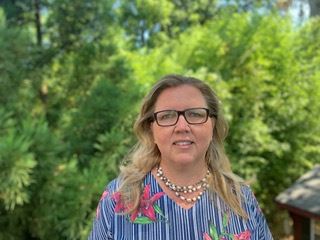The FIGT community welcomes new members to its Board, beginning October 1st. In this post, incoming Nominations Director Daniela Draugelis answers a few questions about herself and what her new role means to her.
 Can you please briefly describe your FIGT role?
Can you please briefly describe your FIGT role?
I am the incoming Nominations Director. As such, I will be responsible for overseeing the FIGT volunteer community. This includes following up with individuals who reach out about volunteer vacancy positions and liaising with FIGT Directors who have volunteer needs. I also support Directors in crafting committee role descriptions and following volunteer standard operating procedures, as well as maintaining the volunteer community records and placements.
I don't do this alone. I will work with four Nominations Committee members who will help me identify, screen, and select individuals to serve in open Director roles and contribute to creating the Board development and onboarding strategy.
What inspired you to stand for this particular office?
As it is common in our globally global lives, my family will be relocating from Washington DC, USA to Islamabad, Pakistan later this year. After spending the last four years building the FIGT-DC Affiliate and getting to know the amazing FIGT community, I was looking for a way to remain involved in FIGT and continue to contribute to the organization from my new location.
I have been volunteering for different organizations from a very early age and strongly believe that volunteering provides many benefits - physical, mental, social and emotional. It provides you with an opportunity to explore skills, creativity, motivation, and vision that you can carry into your professional life. It can also provide a sense of accomplishment, increase your self-esteem, self-confidence and life satisfaction. But most importantly, volunteers are sometimes the glue that hold a community together and make it a better place, where even the smallest task can make a big difference. I am hoping that through my role as Nominations Director overseeing the volunteer community I can make a positive impact in the greater FIGT community.
Anything you particularly hope to accomplish this year? What do you look forward to?
I am looking forward to motivating members to volunteer and engaging with them throughout the year, showing them the value of their work and their contributions to the FIGT community. I am also looking forward to working with the FIGT Board members, learning from them, developing relationships, friendships and contributing to the growth and betterment of FIGT.
 Your favorite thing about being a part of FIGT?
Your favorite thing about being a part of FIGT?
It has been said many times that FIGT has been “life-changing” for many people, and I couldn’t agree more. Since I found FIGT, I finally found a place where I belonged. My favorite thing? The personal and virtual connections I’ve made with people who “get me”, that don’t look at me strangely when I tell them my “long story”, or that I have three passports, and I’ve lived in five countries, and speak four languages. It is that sense of belonging to a community of like-minded people who share a common background, a common sense of identity that brings us together and bonds us. Where geographic distances do not matter; where age and gender do not matter. Where all that matters is that we can all lean on each other even during the hardest times without needing to explain why, because we’ve all traveled down the same road and know what it means to live “in global transition”.
Can you share a random piece of info about yourself?
Growing up in Argentina, I did not have a telephone in my house until I was 17 years old, which was quite challenging as a teenager when boys started asking me for my phone number after a first date! So what did I do? I had to say “I don’t have a phone at home, but you can give me yours, and I can call you!”. So if I liked the boy I would go to the closest payphone and call him to arrange the next date. Alternatively, I would say “Or you can call my mom at work and leave her a message and I will call you back.” Some brave souls did… I believe this might have contributed to my bold and assertive personality.
 Please share some words of wisdom for FIGT members and globally mobile people in general.
Please share some words of wisdom for FIGT members and globally mobile people in general.
Don’t be shy to connect with people, listen to their stories, ask questions. There are invaluable resources in the FIGT website produced by incredibly talented professionals and people who’ve walked the same walks of life as you have. Take the time to explore and follow us on social media because you might find a connection, that a-ha moment that you were searching for, or the inspiration to start something new - a business, a book, or an affiliate in your own city. The energy of FIGT is contagious!
To other globally mobile families and individuals - you are not alone! You don’t have to embark on this journey alone. FIGT is a community of people who have “been there, done that ''. We understand the challenges that come with living a globally mobile life - from moving, parenting, career obstacles, social and emotional difficulties, cultural adaptation, school choice, to repatriation and reverse culture shock. We also understand the amazing benefits and rewards that come with living a culturally rich and diverse globally mobile life, and how difficult it could be to sometimes balance it all! You are not alone. The FIGT community can offer a place where you may find like-minded people to lean on and resources to help you make sense of it all. Come join us - there is a place for you here!

